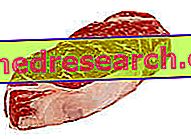Resveratrol
Resveratrol is a substance produced by different plant species which, thanks to its marked antioxidant properties, helps protect our body from cardiovascular and cancer diseases. It is even told of his - alleged - ability to increase life span, supported by timid scientific evidence demonstrated by some preliminary studies on worms ( C. elegans ) and fruit flies ( D. melanogaster ), and never confirmed on humans.

Resveratrol in Wine
In the plant kingdom, resveratrol, which has antifungal functions, is found in particular in the skin of grapes and in wine, to a greater extent in the red one.
The cardioprotective effects of this drink, typical of the Mediterranean food culture, are largely related to its resveratrol content. The doctors, however, invite us not to let ourselves go to useless and dangerous enthusiasms, since the beneficial properties that can be ascribed to wine depend on different factors, first of all the dose, which must be moderate (2-3 glasses per day in men, a little less in the woman).
In addition to color, the resveratrol content of wine also depends very much on the cultivation and processing of grapes. This substance, produced by the plant for its valuable antifungal activity, is obviously more abundant in grapes not treated with fungicides and pesticides. Furthermore, the resveratrol content of the wine is as much higher as it is fermented together with the skins.
| Wine (of Spanish origin) | Total Resveratrol (mg / L) | Daily dose of wine equivalent to 50 mg (*) of resveratrol (L) |
| White wine | 0.05 to 1.80 | 27.7 to 1000 |
| Rose wine | 0.43 to 3.52 | 14.2 to 116.3 |
| Red wine | 1.92 to 12.59 | 4 to 26.0 |
| Red grape juice | 1.14 to 8.69 | 5.7 to 43.9 |
| * Some studies come to propose dosages of resveratrol equal to 1000 mg (1g) per day for at least 6 months, that is 20 times higher. | ||
Other factors that influence the content of resveratrol in wine:
COLOR: in the production of white wine fermentation takes place without the contact of the must with the skins (fermentation in white). Since resveratrol is present in the skin of grapes and not in the pulp, it is logical to expect that the content of the substance is lower than in red wines, generally produced with fermentation on the skins.
GEOGRAPHIC ORIGIN: wines produced at high altitudes seem to have a higher resveratrol content (this substance protects the plant from UV rays). The latitude does not seem to significantly influence the concentration of the substance.
VINTAGE: climatic conditions that favor a slight fungal attack increase the synthesis of resveratrol in the plant (this substance has an antifungal action).
FERTILIZATION: the concentration of resveratrol in grapes increases with decreasing nitrogen fertilization (Bavaresco et al., 2001).
The French paradox
When we talk about resveratrol, we cannot avoid a minimum hint of the French paradox.
In the late 1980s, two scientists (Renaud and De Lorgeril) studied the correlation between mortality due to coronary heart disease and intake of animal fats in the diet. The population samples studied provided a clear result, by now known to most people: the higher the average daily consumption of animal fats and the higher was the mortality. Of all the countries examined, only the French sample (collected between the cities of Lille, Strasbourg and Toulouse) provided results contrary to this conclusion. Despite the high consumption of animal fats, the French did indeed record the lowest mortality rate from coronary heart disease. Since dismissing the fact as the exception that confirms the rule has little scientific, the two French researchers tried to give an answer to this paradox. From the statistical observation of the greater consumption of wine on French soil, the hypothesis arose that this drink could counterbalance the effects of the high ingestion of animal fats. Since the negative effects of alcohol had already been widely documented and that wine had proved more effective than other alcoholic beverages in reducing the incidence of these diseases, the second step was to hypothesize that the basis of the French paradox is not there was alcohol but other substances present in wine and not yet investigated.
The study of the drink led to the discovery of resveratrol (Siemann and Creasy -Cornell University, Ithaca, NY, Usa-1992) and other similar substances, such as piceatannol, pterostilbene, epilon-viniferine, piceide (resveratrol glucoside ).
Does resveratrol work?
The biological activities of resveratrol are varied and well documented. First of all, from a clinical point of view, its protective action on cardiovascular diseases has been scientifically demonstrated. The substance is also endowed with a powerful antioxidant activity. The antitumor abilities of resveratrol, supported by various studies, are still awaiting clinical confirmation.
Although most of the benefits ascribed to this substance have been scientifically confirmed, the high dosages required to obtain these "protective" effects have seriously reduced the enthusiasm for red wine . Even if in this regard there is no univocal indication, to reach the levels of resveratrol intake proposed by the different studies, surely harmful quantities of wine (several liters per day) would be necessary.
Having established that the hope of exploiting the antioxidant properties of resveratrol through the consumption of wine has no scientific value, it is fair to ask whether a moderate consumption of this drink has positive effects on human health or not. In this regard it is not possible to give a definite answer because, starting from the assumption that alcohol is an oncogenetic substance, there are some studies (not all) that confirm the health virtues of wine.
Since epidemiological research has established that alcohol is the third leading cause of death in Italy, a potentially useful dose in the prevention of cardiovascular disease could lead to a higher risk of developing other serious diseases. Furthermore, too much enthusiasm for wine and its resveratrol could favor the spread of alcoholism.
For this reason, when it comes to wine, reasonable low-risk intake limits are set, usually found in about 24-30 g of alcohol per day for men and 12-15 g per day for women, equal to 1 -2 glasses of wine (150-300 ml). Finally, it is worth remembering that wine, regardless of its resveratrol content, has above all a cultural and convivial meaning. His health aspects, on the contrary, no matter what I say, are still awaiting confirmation.
Doses, instructions for use and side effects of resveratrol supplements
In the form of a food supplement, it is advisable to swallow resveratrol capsules for breakfast or rather fasting, avoiding the concomitant intake of fat-rich meals, which could halve their bioavailability. It is more difficult to establish and suggest an ideal dose of resveratrol (in this regard, there is no clear and unambiguous indication in the literature); if this antioxidant is taken alone, a good compromise between the minimum doses of efficacy and those that would cause adverse effects in the short term (mostly diarrhea) and long term (yet to be demonstrated) could be 200/400 mg per day. Unlike the case in which resveratrol is inserted in a polyvalent antioxidant mix (for example associating it with other polyphenols, vitamin E, vitamin C, lipoic acid ...); in this case the doses of intake can be lower, but in any case in the minimum reasonable order of some tens of mg.
Below 25 mg per suggested daily dose, the presence of resveratrol in a supplement is to be considered of pure commercial appeal.



